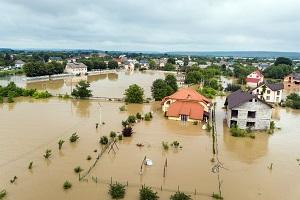Water, health, climate change and disaster risk reduction are interlinked and interdependent. For example, with climate change, floods and droughts increase in both intensity and frequency. Floods can damage water and sanitation infrastructure, disrupt essential public service provision, undermine ecosystem services that are vital for human health, and lead to outbreaks of waterborne diseases in affected communities. Droughts can reduce the availability or have an impact on the quality of water, limiting its use, including public drinking water supplies.
Thus, the Global workshop on building climate resilience through improving water management and sanitation at national and transboundary levels (Geneva and online, 29–31 March 2021) looked, from a holistic perspective, at the impacts of climate change and extreme weather events on water resource management, both at the national and the transboundary levels, and on water supply and sanitation systems and, ultimately, human health.
During the workshop, such countries as Bangladesh, Ethiopia, Italy and Jordan shared their experience in addressing the impacts of climate change on water, sanitation and health aspects and integrating them into national climate policies. In addition, a presentation was given on how the joint Working Group on Emergencies under the bilateral (Moldovan-Ukrainian) Commission on Sustainable Use and Protection of the Dniester River Basin is facilitating joint planning and actions in flood management, helping countries to adapt to climate change and to implement the European Union Floods Directive. Moreover, presentations on the Drin River and the Volta River basins showcased how the Adaptation Fund, as well as partnership between river basin organizations and national and international actors, facilitate joint flood and drought management to better adapt to climate change.
The workshop helped the participants to better understand the role of water as a common thread linking the key global goals of the Paris Agreement under the United Nations Framework Convention on Climate Change and the 2030 Agenda for Sustainable Development with national commitments on climate change. Thus, it was concluded that integrating water and sanitation, as well as the benefits of transboundary/regional cooperation, into national climate policies such as, for example, Nationally Determined Contributions (NDCs) and National Adaptation Plans (NAPs), is crucial for strengthening the resilience of our economies, societies, health and well-being.
The workshop also acknowledged that the Protocol on Water and Health is a powerful multilateral instrument that helps countries systematically address water- and sanitation-related health risks arising from a changing climate.
In addition, the workshop concluded that cooperation at the regional and transboundary levels is important for reducing disaster risks and preventing maladaptation, for example, through: sharing data; basin-wide early warning and monitoring systems; and prioritization and joint implementation of adaptation measures, including nature-based solutions. Moreover, this can increase trust and promote transboundary cooperation more broadly. The important role of the Convention on the Protection and Use of Transboundary Watercourses and international Lakes (Water Convention) in helping countries jointly address climate change and disasters was acknowledged in this regard.
The workshop highlighted that a few transboundary basin organizations, for example, in the Amazon, Chu Talas and Senegal River basins and the Lake Victoria basin, had integrated health and water, sanitation and hygiene (WASH) issues into their activities, with that trend increasing, perhaps due to the coronavirus disease (COVID-19) pandemic.
For example, the Amazon Cooperation Treaty Organization pays significant attention to the health situation of indigenous peoples in border areas by developing health contingency plans, coordinating actions in border areas and strengthening indigenous early warning mechanisms. In addition, the Chu Talas Commission includes water quality and health issues in its basin development, for example, in its joint action programme and the activities of the Working Group on Environmental Protection. Moreover, the Lake Victoria Basin Commission and the Organization for the Development of the Senegal River integrate health and WASH issues into their transboundary policies and regulations and implement specific measures focused on joint monitoring, wastewater treatment, supporting disease surveillance and infectious disease prevention.
Finally, the workshop concluded that increasing funds are available for climate change adaptation and mitigation, and it is therefore important to submit good project proposals on water, WASH and climate change, including regional and transboundary water cooperation, highlighting the climate rationale, and to mainstream these issues into NDCs and NAPs.
The participants in and partners of the workshop decided to bring the workshop conclusions and outcomes before the twenty-sixth session of the Conference of the Parties to the United Nations Framework Convention on Climate Change (Glasgow, United Kingdom of Great Britain and Northern Ireland, 1–12 November 2021) to enable greater promotion of water, sanitation and the benefits of transboundary cooperation in the global climate change agenda.
The workshop was organized by the United Nations Economic Commission for Europe as secretariat of the Water Convention and co-secretariat of the Protocol on Water and Health, with the World Health Organization Regional Office for Europe, under the leadership of Italy, the Netherlands and Switzerland, in cooperation with the Alliance for Global Water Adaptation, the Global Commission on Adaptation, the International Network of Basin Organizations, the United Nations Office for Disaster Risk Reduction and the World Meteorological Organization.
More information on the workshop, including the relevant documents and presentations, is available at https://unece.org/environmental-policy/events/global-workshop-building-climate-resilience-through-improving-water.


